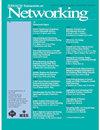基于深度分布强化学习的自适应路由与保证延迟边界
IF 3.6
3区 计算机科学
Q2 COMPUTER SCIENCE, HARDWARE & ARCHITECTURE
引用次数: 0
摘要
需要在指定期限内通过无线多跳网络及时传输数据的实时应用程序越来越多。能够保证实时QoS的有效路由协议至关重要,但也具有挑战性,因为不可靠的无线信道会导致端到端延迟的不可预测变化。在这种情况下,端到端延迟的上界,即最坏端到端延迟,应保证在最后期限内。然而,现有的保证时延边界的路由协议,由于假设最坏情况端到端时延已知,忽略了路由策略对最坏情况端到端时延确定的影响,无法严格保证实时QoS。在本文中,我们放宽了这一假设,并提出了DDRL- argb,一种使用深度分布强化学习(DDRL)的具有保证延迟边界的自适应路由。DDRL- argb采用DDRL共同确定最坏情况下的端到端时延,学习路由策略。为了准确确定最坏情况下的端到端延迟,DDRL-ARGB采用分位数回归深度Q-network学习端到端延迟累积分布。为了保证实时的QoS, DDRL-ARGB在最坏情况下的端到端时延约束下对路由决策进行优化。为了改善流量拥塞,DDRL-ARGB在做出路由决策时考虑网络拥塞状态。广泛的实验结果表明,DDRL-ARGB能够准确计算最坏情况下的端到端时延,在两种最先进路由协议的容错概率较小的情况下严格保证实时QoS。本文章由计算机程序翻译,如有差异,请以英文原文为准。
Deep Distributional Reinforcement Learning-Based Adaptive Routing With Guaranteed Delay Bounds
Real-time applications that require timely data delivery over wireless multi-hop networks within specified deadlines are growing increasingly. Effective routing protocols that can guarantee real-time QoS are crucial, yet challenging, due to the unpredictable variations in end-to-end delay caused by unreliable wireless channels. In such conditions, the upper bound on the end-to-end delay, i.e., worst-case end-to-end delay, should be guaranteed within the deadline. However, existing routing protocols with guaranteed delay bounds cannot strictly guarantee real-time QoS because they assume that the worst-case end-to-end delay is known and ignore the impact of routing policies on the worst-case end-to-end delay determination. In this paper, we relax this assumption and propose DDRL-ARGB, an Adaptive Routing with Guaranteed delay Bounds using Deep Distributional Reinforcement Learning (DDRL). DDRL-ARGB adopts DDRL to jointly determine the worst-case end-to-end delay and learn routing policies. To accurately determine worst-case end-to-end delay, DDRL-ARGB employs a quantile regression deep Q-network to learn the end-to-end delay cumulative distribution. To guarantee real-time QoS, DDRL-ARGB optimizes routing decisions under the constraint of worst-case end-to-end delay within the deadline. To improve traffic congestion, DDRL-ARGB considers the network congestion status when making routing decisions. Extensive results show that DDRL-ARGB can accurately calculate worst-case end-to-end delay, and can strictly guarantee real-time QoS under a small tolerant violation probability against two state-of-the-art routing protocols.
求助全文
通过发布文献求助,成功后即可免费获取论文全文。
去求助
来源期刊

IEEE/ACM Transactions on Networking
工程技术-电信学
CiteScore
8.20
自引率
5.40%
发文量
246
审稿时长
4-8 weeks
期刊介绍:
The IEEE/ACM Transactions on Networking’s high-level objective is to publish high-quality, original research results derived from theoretical or experimental exploration of the area of communication/computer networking, covering all sorts of information transport networks over all sorts of physical layer technologies, both wireline (all kinds of guided media: e.g., copper, optical) and wireless (e.g., radio-frequency, acoustic (e.g., underwater), infra-red), or hybrids of these. The journal welcomes applied contributions reporting on novel experiences and experiments with actual systems.
 求助内容:
求助内容: 应助结果提醒方式:
应助结果提醒方式:


